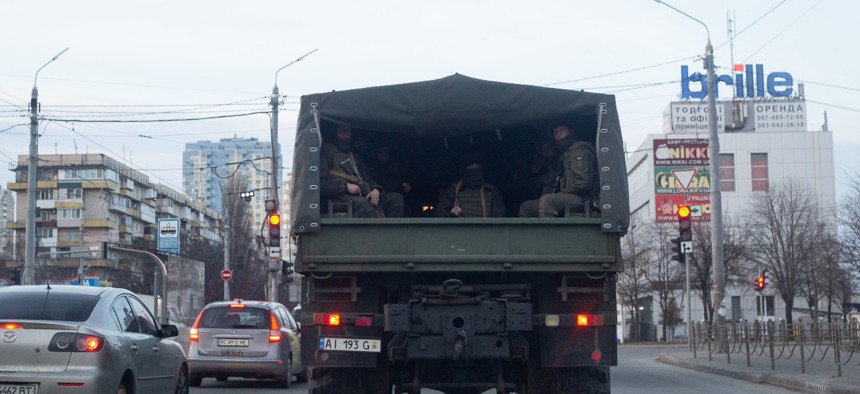
A military vehicle with Ukrainian servicemen drives down the road on February 25 in Kyiv, Ukraine. Anastasia Vlasova/Getty Images
Here's What Is Happening With the Federal Employees Evacuated From Ukraine
Groups look to provide aid to families of those required to relocate suddenly, some of whom left possessions and pets behind.
Many of the U.S. diplomats stationed in Ukraine and surrounding countries are now back in Washington, helping remotely as part of a task force to address Russia’s invasion.
Those State Department employees had moved in country from Kyiv to Lviv, and then to Poland, in recent days, but many of them have since been relocated stateside. Including family members, several hundred people have been evacuated. There are still about 100 foreign service officers left in Moscow, while a State Department spokesperson said a "core team" remains in Poland.
"We will continually assess the security situation to determine when it may be safe for U.S. government personnel to return to Ukraine to conduct diplomacy on the ground and provide in-person consular services," the spokesperson said. "Our support transcends one location, and there are many ways we can continue communication and coordination with those inside and outside Ukraine while not physically present for the time being."
Eric Rubin, head of the American Foreign Service Association, said his joint professional association and union is working with ad hoc groups recently established to provide financial assistance for employees and families relocated from Ukraine and Belarus. Those in Washington are largely living out of hotels and struggling to find and pay for child care services, given COVID-19 restrictions still in place. Others are still seeking to make arrangements for their possessions, which they left behind at their duty posts. Some families were even forced to leave their pets behind, Rubin said, as they had to leave on commercial flights that did not allow animals.
“We don’t doubt that it’s not easy for President Biden, for the administration, for the allied governments, but what we’re saying is we’ve got to support our people, in the field and in Washington,” said Rubin, who has engaged in conversations with State officials to raise his concerns. “This is shocking and scary and we’re going to do everything we can to support our colleagues, and do what we can to support both the U.S. government and our allies.”
Adding to the pressures is many foreign service officers are still owed thousands of dollars from State after a recent glitch in the payroll system shorted them various parts of their compensation. And while State personnel made up the majority of impacted federal workers, the U.S. Agency for International Development and about a dozen other agencies with a presence at the Kyiv embassy were forced to evacuate staff.
“We’re pushing as much as we can for all the agencies to provide additional help, to advance financial support if people need it,” Rubin said. “It’s a very difficult time.”
AFSA is also pulling what levers it can to get assistance to locally employed staff at the Kyiv embassy. Some of those individuals have worked for the embassy for decades, but have not been afforded any evacuation assistance from the U.S. government.
Those employees are “very scared and are concerned they could be targeted for having worked for us,” Rubin said, who has called on State to help them financially or to get out of Ukraine if they wish to leave.
State Department spokesman Ned Price said during a briefing Friday the department is looking at ways to help. “We are exploring all legal options available to us to enable us to support them at what is clearly a very difficult time for our locally employed staff,” he said.
Employees relocated to Washington have their hotels paid for and earn per diems, but those benefits are set to expire after 90 days. They are hoping it is feasible to return to Kyiv and Minsk, Belarus, within that time period, but otherwise will have to accept other posts. In the meantime, Rubin said, they are “being put to work on the crisis" as part of a 400-person task force.
“They have a lot of experience and background, and that’s what should happen,” he said. The State spokesperson said the task force was involved in embassy contingency planning, policy efforts, management issues and logistics.
AFSA is working with State to ensure employees still in Poland and Russia are getting the support they need. How long U.S. personnel remain in Moscow is unclear, as the Russian government last week expelled the American embassy’s second in command and the Biden administration retaliated by doing the same to his counterpart on Thursday. Politico reported on Friday that State instructed all federal agencies to cancel "all official, government-to-government contacts with Russian government representatives which would not compromise major U.S. national interests.”
Update: This article has been updated to include comment from State Department spokesman Ned Price on helping locally employed embassy staff.







